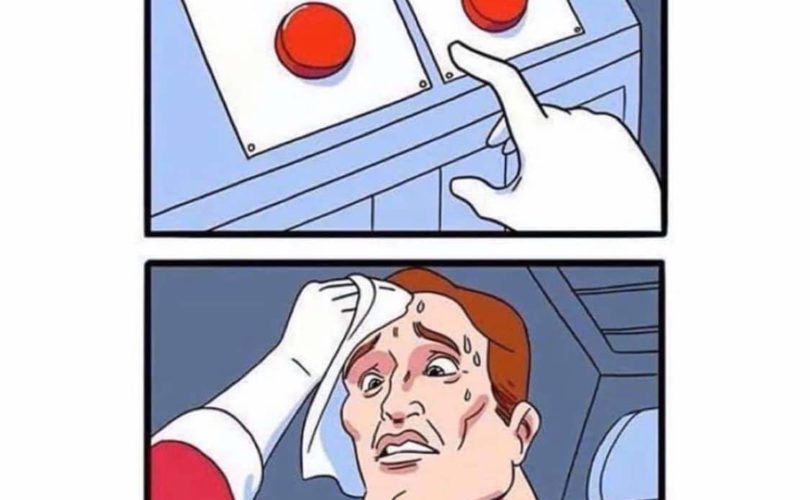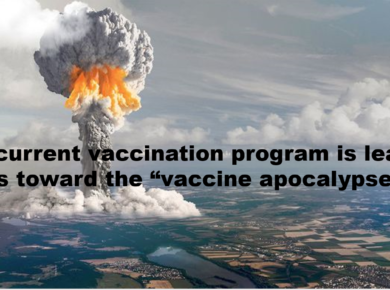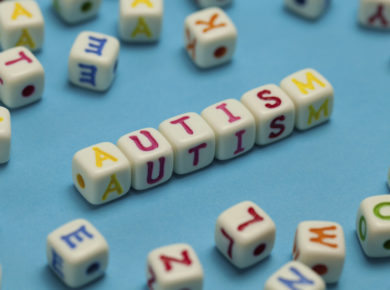We can agree that the flu vaccine is most likely the most useless vaccine ever. Year after year, the Cochrane Collaboration demonstrates this point, that the flu shot does not help to prevent someone to get the flu.
In support of this, last year’s flu shot was about 10-15% efficient.
It is ludicrous to believe that a shot would protect us against thousands of viruses.
Interestingly, getting the flu shot every year seems to reduce its effectiveness.
Indeed, look at these studies:
“Repeated flu shots may blunt effectiveness” in CMAJ. 2015 Apr 7; 187(6)
and
“A perfect storm: impact of genomic variation and serial vaccination on low influenza vaccine effectiveness during the 2014-15 season.” In Clin Infect Dis 2016 Mar 29
In the 2014-15 influenza season, when seasonal flu vaccines performed unusually poorly overall, people who had not been vaccinated the previous year were the ones most likely to benefit from the vaccine, whereas those who were vaccinated 2 years in a row did not, a new study from Canada’s influenza surveillance network suggests.
In an even more unusual finding, people who were vaccinated 3 years in a row, in the 2012-13, 2013-14, and 2014-15 seasons, appeared to have a higher risk of being infected with the dominant flu strain in the latter season, according to the report, published last week in Clinical Infectious Diseases.
That surprising result echoed controversial findings reported by the Canadian flu surveillance network in the wake of the 2009 H1N1 flu pandemic.
In studies published in 2010, researchers said they found that Canadians who had received a seasonal flu shot in the fall of 2008 were 1.4 to 2.5 times more likely to get an H1N1 infection requiring medical attention, compared with those who didn’t get the seasonal shot.
The authors could not explain the apparent negative effects of “serial vaccination.” But the findings raise questions about standard flu vaccination recommendations, which stress getting a flu shot every year to fight off the ever-mutating viruses.
The answer is pretty simple to me. When you receive this shot, the body is busy to detox and handle all those toxins. Consequently, the immune system gets depleted, and you are at risk of getting sick.
Danuta Skowronski, MD, lead author of the new study and lead epidemiologist for flu and emerging pathogens at the British Columbia Centre for Disease Control, said the study does not have immediate implications for flu vaccination policies, but it does add to previous evidence that prior-year vaccination can affect the performance of seasonal flu vaccines. She noted that several other studies have suggested such effects.
See the logic of those vaccine pushers: they can’t admit they are wrong! She admits that there are several studies showing the lack of benefits from the flu shot and that it has consequences to get it annually. Despite that, they won’t make any changes to their recommendations!
Pathetic!
The 2014-15 season was an exceptionally bad one for flu vaccine effectiveness (VE) in both Canada and the United States, with a nonsignificant VE of just 9% in Canada, notes the study.
In the United States, overall VE for the season was estimated at 23%.
The authors described the poor flu VE in 2014-15 as the result of a “perfect storm” of conditions that included antigenic drift in the circulating viruses and the use of the same flu strains in the vaccine two years in a row, along with the effects of repeated vaccination.
That does not sound too good!
Brendan Flannery, Ph.D., lead investigator with the US Centers for Disease Control and Prevention’s (CDC’s) Influenza Vaccine Effectiveness Network, said the CDC’s findings on flu VE in 2014-15 were similar to the Canadian results overall
The study was conducted by Canada’s Sentinel Practitioner Surveillance Network (SPSN), consisting of a number of outpatient clinics in British Columbia, Alberta, Ontario, and Quebec.
In this approach, patients who seek care for influenza-like illness (ILI) are tested for flu, and their vaccination status is determined. Flu VE is calculated by comparing the numbers of vaccinated and unvaccinated patients who test positive.
The researchers included 1,939 patients who sought care between Nov 1, 2014, and Apr 30, 2015, about 63% of whom were non-elderly adults.
Overall, 36% of them had received a flu shot, and this proportion did not differ significantly between those who tested positive for the virus (34%) and those who did not (36%), the report says.
Among patients who received the 2014-15 flu vaccine and were old enough to have been vaccinated in previous seasons, 87% (567 of 655) had also been vaccinated in 2013-14, and 82% (507 of 618) had received the flu shot each season since 2012-13.
Of 1,939 patients, 814 (42%) tested positive for flu, with 590 (72%) having influenza A and 225 (28%) influenza B. Almost all (99%) of the type A viruses were H3N2 isolates.
The overall effectiveness of the 2014-15 vaccine against medically attended flu was found to be 9%.
The adjusted VE against all H3N2 viruses was 16%.
In looking for prior-vaccination effects, the team found that the VE against H3N2 for those vaccinated in 2014-15 but not the year before was 53%.
For those vaccinated in all 3 seasons ending in 2014-15, VE against H3N2 was estimated at 54%, suggesting a significant increase in the risk of flu because the entire confidence interval was less than zero.
VE in those vaccinated in 2014-15 but not in 2013-14 was 61%, while VE for those vaccinated in both seasons was 33%.
For participants vaccinated three years in a row, VE was just slightly lower, at 28%.
In their virologic analyses, the team found that the H3N2 viruses had 10 to 12 antigenic amino-acid changes relative to the 2014-15 vaccine virus.
Skowronski said it has been recognized for decades that prior vaccination can affect flu VE.
Some recent studies suggesting that consecutive-year vaccination can lower VE have come from the University of Michigan and the European Union’s flu surveillance network.
The Michigan group found the effect in studies of households in the 2010-11 and 2012-13 flu seasons, while the European network observed the effect in the 2014-15 season.
In a Feb 18 report in Eurosurveillance, the European authors wrote that the finding was “congruent with the hypothesis that prior immunization may decrease the effectiveness of the vaccine and that this negative interference is more important when the antigenic distance is small between successive vaccine components but large between the vaccine and circulating strain.”
Skowronski said her group’s new findings represent only the second time the Canadian SPSN has found evidence that prior-year vaccination can go beyond “blunting” and actually increase the risk of flu, the first time having been in the 2009 pandemic.
In that case, the pandemic H1N1 virus was “drastically mismatched” with the H1N1 strain in the prior year’s seasonal flu vaccine, she noted.
The new study marks the first suggestion that vaccination more than two years in a row can increase the risk of infection with a drifted seasonal flu strain.
“It’s the lowest VE in a decade,” she added. “We can’t just report that and move merrily along and hope it won’t happen again.”
The Canadian study won praise from another researcher who studies flu VE, Lisa Jackson, MD, MPH, a senior investigator with the Group Health Research Institute in Seattle.
“I think this is a really good paper,” she commented via e-mail. “Their results are consistent with results that will be reported from the US Flu VE network, but our VE estimates were higher. The evidence for a detrimental effect of prior vaccination needs to be interpreted cautiously, as indicated, but has been reported in multiple prior publications and is consistent with lower HI [antibody] titers post-vaccination in persons previously vaccinated.”
Every year, those who swear by the influenza vaccine eagerly get jabbed. Others vehemently maintain that flu shots are either useless or do more harm than good. The latter camp, however, may now have some additional ammunition.
In conclusion, these studies and others are raising the specter that the more influenza vaccinations you receive in your lifetime, the less protection you have from the virus in subsequent seasons.






